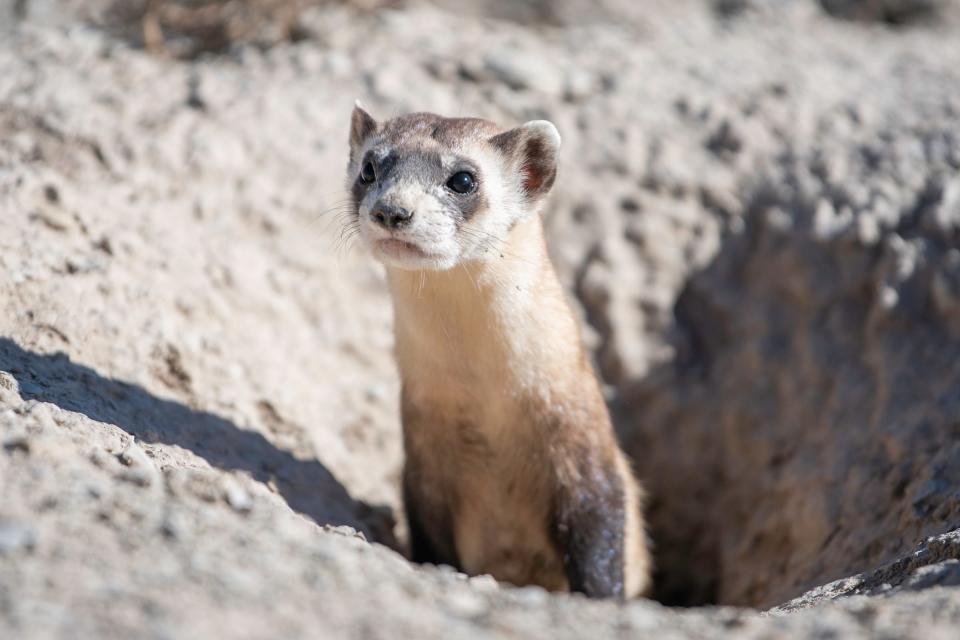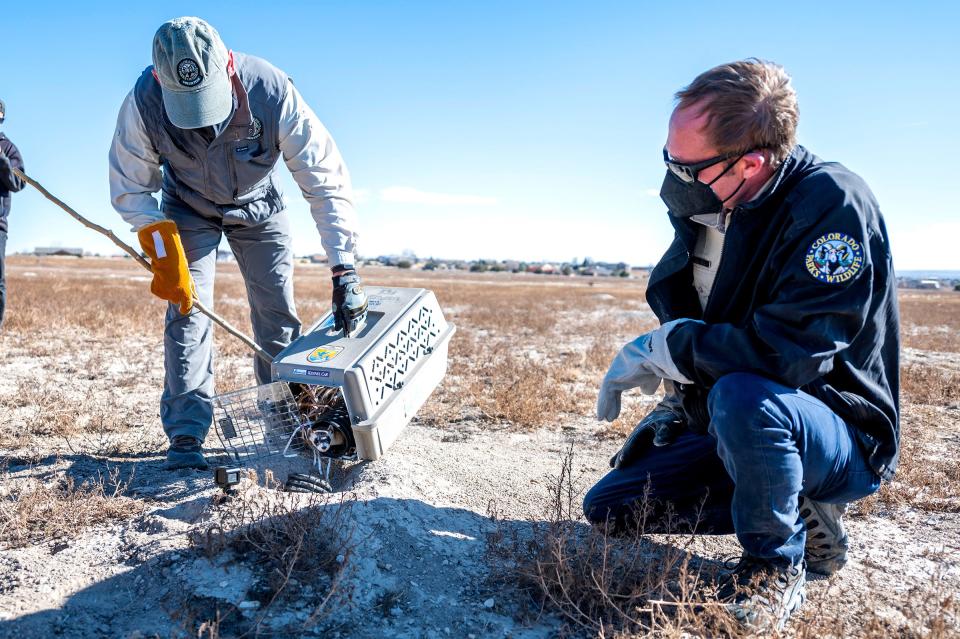Endangered black-footed ferrets continuing epic comeback with help from Pueblo sites
Pueblo is poised to offer up prime habitat in the battle to restore black-footed ferret populations to the prairie land the nation's most endangered mammal once called home.
Since 2013, more than 125 black-footed ferrets have been released on the Walker Ranch near Pueblo West. By this fall, the reintroduction effort will expand east of Pueblo to the Pueblo Chemical Depot property and a neighboring ranch where as many as 25 of the ferrets will be released, said Ed Schmal, a Pueblo-based wildlife biologist for Colorado Parks and Wildlife.
The saga of the ferret species, which was once thought to be extinct, has a remarkable storyline. The last wild black-footed ferret was recorded near Buena Vista in 1943 and by 1979, the last captive ferret died, so the species was believed to be lost.

Miraculously in 1981, a small colony, or remnant population, of 129 ferrets was discovered on a Wyoming ranch. However, plague and canine distemper caused severe declines in their numbers. By 1986, fewer than two dozen survivors were trapped.
Thanks to a captive breeding program involving the U.S. Fish and Wildlife Service and zoos, seven of the surviving ferrets were able to breed. Today Colorado Parks and Wildlife staff estimates there are about 605 black-footed ferrets left in the world, about half of which are living in the wild.
Before release, ferrets have to display their ability to survive in the wild, preparation for which takes place at the National Black-Footed Ferret Conservation Center in Larimer County.
Helping the ferrets thrive has also meant working to ensure prairie dogs at release sites are healthy, because they provide 90% of the ferrets’ diet and their living quarters. The effort also has expanded to an unlikely partner — terrier dogs — who are being trained to detect ferret scent to help biologists monitor the colonies.
More ferret news: 5 critically endangered black-footed ferrets find a new home on Pueblo West ranch

The elusive ferrets are tough to monitor
“We rarely see black-footed ferrets after we release them. We have deployed trail cams all over the prairie dog colonies at Walker Ranch and other release sites and have little to show for it, I'm afraid,” said Bill Vogrin, public information officer for Colorado Parks and Wildlife's Southeast region.
“We have had some trouble,” Schmal agreed. “Primarily we do spotlighting in the late summer or early fall looking for eye shine at night, and if we see a reflection that does not register on the ring reader we assume it is a wild-born kit.”
Because each captive ferret is fitted with a pit tag before it is released in the wild, wildlife biologists can help keep tabs on the nocturnal creatures by setting up ring readers in the colonies.
“If we have a wild-born kit we will put a trap out and try to trap it and fit it with a pit tag. We have not found any wild-born kits at Walker Ranch yet, but we have at other sites like Rocky Mountain Arsenal near Denver,” Schmal explained.
With the help of an outside group in charge of the canine training, CPW hopes “to use scent dogs for future monitoring because it is less resource intensive. The small, terrier mixed breeds started training last fall,” Schmal said.
Another training will be conducted soon at the depot property in Pueblo, which can be used as a control site to see how the scent dogs are reacting in an environment that does not yet have black-footed ferrets, Schmal explained. The dogs also are being trained at ferret release sites near Lamar and Fort Collins.
Once the national wildlife office knows how many ferrets it will have this year, it will determine allotments for each state. Colorado, Arizona, Wyoming, Utah and several other states are all lined up to receive ferrets for release in the wild.
“Usually we will get 15 to 20 to release on the Walker Ranch, but the depot may get more like 20 to 25 since this is the first year for releasing them there,” Schmal said.
Healthy prairie dogs equal healthy ferrets
In preparation for the ferrets, the U.S. Army, wildlife agencies and private land owners have spent three years trapping prairie dogs from other locations such as an eastern Pueblo solar farm site or a future highway expansion site in Pueblo West, and released them on the depot property.
“The prairie dogs are doing much better there. This summer we will conduct insecticide dusting to control the fleas, which are the main vector of the plague, and the prairie dogs have been given an (oral) vaccine to help build up their resistance to plague,” Schmal said.
Healthy prairie dogs are not only good for the ferrets, they help other species, too, including federally-protected Western burrowing owls that use prairie dogs' abandoned holes for nesting and roosting.
Ultimately, the goal is to have a healthy black-footed ferret population in the wild so humans can “walk away and they will be self-sustaining. We are nowhere near that at this point, but that’s the goal,” Schmal said.
For Schmal, helping North America’s most critically endangered mammal is the “crown jewel” thus far in his 18-year career and work he said he feels pride in doing.
To celebrate a decade of wildlife conservation work helping to restore the black-footed ferret, Colorado Parks and Wildlife has released an educational video documenting its history and the agency’s recovery efforts.
More ferret news: Ferreting-out a new home: Endangered black-footed ferret found in Pueblo West garage
Chieftain reporter Tracy Harmon covers business news. She can be reached by email at tharmon@chieftain.com or via Twitter at twitter.com/tracywumps.
This article originally appeared on The Pueblo Chieftain: Black-footed ferrets continue comeback with help from CPW, Pueblo sites

